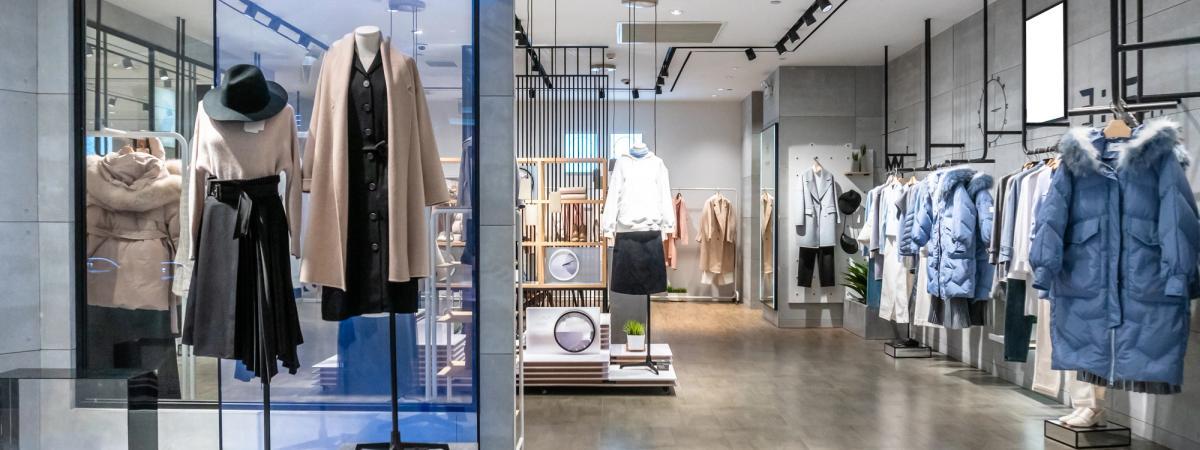
Retail Business Insurance: What Coverages Do You Need?
Retail businesses face unique risks. They don’t just have a lot of foot traffic coming through stores; they might also have large amounts of money tied up in inventory or various properties sitting on the premises or in a warehouse.
This means you not only have a premises liability risk if a customer hurts themselves in your store or in the parking lot, but you also have the risk of something happening to the property you’ve invested so much in.
In addition, if you sell a product that ends up harming one of your customers, you could get drawn into a product liability lawsuit with the customer and the product’s manufacturer. I'm not saying you would ultimately be responsible, but we regularly see retailers listed on and forced to fight their way out of product liability lawsuits by proving they were not negligent.
The good news is that a couple of very common insurance policies can cover these events, and often for a low cost. The better news is that insurance for retail businesses isn't particularly hard to find, meaning it should be a relatively easy process to get covered.
Get Coverage For Your Retail Store
Secure a tailored quote for your business today.
Here are the policies you need as a retail business:
General Liability
Every retail business needs a general liability policy. This policy is going to cover most of the liability issues you face as a retail business owner, and it has three primary parts: premises liability, products liability, and personal and advertising injury liability.
We’ll discuss each of those three below.
Premises Liability
The commercial general liability insurance policy covers incidents of bodily injury or property damage to others, such as customers or even a neighboring business, that arise from your business operations.
This could be your customer slipping and falling on your floor, sustaining an injury. It could even be a fire starting in your store and causing damage to a neighboring property.
The high foot traffic associated with retail businesses means premises liability is very important. It’s one of the most frequently used coverages—because every day, customers are walking up and down your aisles, using your furniture, and touching your inventory.
Injuries happen. Premises liability is where you will find coverage for them.
Products Liability
In some instances, if you sell a product and that product harms your customer (possibilities include injury, or possibly a defect that results in a house fire), the customer will file a lawsuit. Unfortunately, that lawsuit will likely involve the manufacturer and the store that sold them the product.
We rarely see retail stores on the hook for the ultimate product liability lawsuit judgment—unless they’re directly importing foreign products. With that said, they usually have to hire a legal defense team and fight their way out, which can cost thousands of dollars and years of time.
Having products liability coverage on your retail business insurance policy means that the insurance company will hire (and pay for) your legal defense team and help you take care of the problem. The insurance company has also dealt with this kind of lawsuit before; they will have expertise from thousands of cases just like yours and can help fix the situation quickly, for as little money as possible.
Personal and Advertising Injury Liability
The third coverage that retail businesses need is personal and advertising injury liability coverage. It covers some intentional torts such as slander, libel, copyright infringement, false arrest, or invasion of privacy.
Imagine that one of your employees sees a customer walking out of the store with an expensive electronic device in his pocket. The employee, trying to make the situation right, takes the customer in the back and won't let him leave until the device is returned to the store and the police arrive. The employee forces the customer to stay in the room for over an hour.
As it turns out, the customer was just trying to return an item that he purchased last week. He forgot to bring the receipt from home to the store.
Your employee just falsely detained that customer. That customer later sues for false imprisonment. This scenario would be covered (civilly, at least) under the commercial general liability policy for false arrest.
Property Insurance
Some retail stores—though not all—have large amounts of money tied up in inventory. Not only will you lose money on the property itself if something happens to it, but you will also lose money from the revenue it would have generated.
Here are some basic property coverages to help cover the assets that your business owns:
Building Coverage
The first thing a commercial property insurance policy covers is the building. If you don't own a building, you can have this marked as zero dollars—you will not have to pay for it. If you do own a building, though, this coverage will cover it from natural disasters, theft, fires, and other perils.
If you own multiple buildings and several retail stores, then you can list all the buildings you own on a single policy.
Business Personal Property (Contents & Inventory Coverage)
If you were to take your store, turn it upside down, and shake it, the property that fell out would be considered business personal property or contents. In other words, it is the property that is not permanently affixed to the building and is located inside.
This could include all your store inventory, furniture, forklifts, and shelving, as well as many other things.
Business personal property coverage will pay to replace the property if it is stolen or damaged as a result of a covered peril.
Tenant Improvements and Betterments
If you are a tenant in a building, you might have spent some money improving your leased space, such as installing cabinets, signage, checkout desks, walls, and other things.
The problem is that you do not own the building, so you have zero building insurance. The improvements are permanently affixed to the building, meaning business personal property coverage does not apply to them.
You can add a tenant improvements and betterments endorsement, which includes these improvements under your contents coverage and will replace them if they are damaged in a claim event.
Property Of Others
Sometimes you will have the property of your customers left in your store—for example, if you are selling it on consignment or repairing it. If there is a fire in your store, your customer will want their property to be covered under your insurance policy.
Having property of others coverage adds this property that you do not own, but you are in the care, custody, and control of.
Please note that this coverage does not apply to many things such as cars, motorcycles, or watercraft. You will need a specialized garagekeepers policy for certain types of property.
Business Income
If your property is damaged in a covered claim, not only do you lose the money you had invested in the damaged property, you are also losing the revenue (or profit) that you would have made as a result of the sale of that property.
If enough of your property is damaged in a claim, you might have to shut down completely while the building is repaired or the property is reordered.
Business income insurance pays for your net income and payroll while you are unable to operate as a result of covered damage to your property.
Cyber Liability
If you take credit cards, rely on computers to conduct daily business transactions, or have an e-commerce site, you should most likely have some sort of cyber liability coverage for your online operations.
In a recent study by Deloitte, retailers are an "irresistible target for cyber-attacks" due to the number of credit card transactions that take place at a typical retail store. In addition, 24% of all cyber-attacks target retailers.
You are exposed to the liability associated with a data breach if any of your clients are harmed as a result. In addition, each state has notification laws that might require to notify all your customers and provide credit monitoring services for years after the incident—resulting in massive expenses.
A cyber liability policy transfers these liabilities associated with a cyber-attack to an insurance carrier to pay for the lawsuits, fines, and other costs associated with the attack.
Employment Practices (EPLI)
Retail has one of the highest turnover rates of any industry—nearly 60%. With high turnover comes a higher likelihood of employment-related lawsuits. Between allegations of retaliation, discrimination, harassment, or breaking federal or state employment regulations, it is a large risk that any retail company should consider.
Employee Coverage
Employee coverage is what you typically think of when you consider what an EPLI policy would cover. There are allegations of racial discrimination, sexual harassment, wrongful termination, wrongful hiring practices, wage and hour claims, and more.
Third-Party Coverage
Third-party coverage encompasses what employee coverage addresses, except it includes third parties—think allegations of discrimination or harassment to customers, vendors, or other groups.
Workers Compensation
In almost every state, if you have employees, you are required by law to have workers compensation insurance. Workers compensation insurance covers any injury that happens to employees while working for the business. In addition to medical bills, this coverage pays for lost wages while the employee is recovering from an injury and unable to work.
Recommendations To Lower Your Insurance Cost
Put adequate theft prevention measures in place.
Theft is one of the most frequent causes for an insurance claim. With that in mind, it is important to consider what protections you have in place to prevent it.
At a minimum, insurance companies like to see central station burglar alarms and video surveillance. It is also a benefit to both you and the insurance company if you have controls around how money is handled and stored when not in the register.
Minimize the risk of a customer injury.
Having prevention measures in place to avoid customer injury can help your insurance rates tremendously. Protections such as signage near slippery areas, proper use of overhead racks to prevent objects from falling, appropriate lighting, snow and ice removal procedures, and other measures can save you a lot of money and headache in both the short and long term.
Hold regular employee safety trainings.
We always suggest holding regular safety training. If your employees are lifting heavy objects or operating any type of machinery, that training becomes absolutely critical.
In-depth training how to properly use equipment and how to lift heavy items can lower your claims activity, lower workers compensation costs, and make you a better place to work in general.
Summary
Retail businesses have unique risks that insurance addresses very well. Although this list of coverages isn't comprehensive, it should provide you with the basics that should cover the majority of claims that you will run into as a retail store.
If you are looking for a quote, you can get an online quote from 10 insurance companies. You can also give us a call if you want our expertise to help you find which policy is best for you and your business!

About The Author: Austin Landes, CIC
Austin is an experienced Commercial Risk Advisor specializing in property & casualty risk management for religious institutions, real estate, construction, and manufacturing.
THE INFORMATION ON THIS WEBSITE IS PROVIDED FOR INFORMATIONAL PURPOSES ONLY. Nothing on this website should be construed as a solicitation, proposal, offer, recommendation, endorsement, or advice regarding any insurance product. The information on this website is of a general nature and is not intended as a substitute for individual consultation with a licensed insurance professional. In no event will we undertake to advise you regarding your need for any insurance product. YOU ARE RESPONSIBLE FOR DETERMINING WHAT INSURANCE PRODUCTS YOU NEED AND IN WHAT AMOUNTS, BASED ON YOUR UNIQUE EXPOSURE TO RISKS AND ABILITY TO BEAR LOSSES. We are licensed insurance brokers in the following states: WA, OR, ID, MT, WY, CA, NV, UT, AZ, CO, MN, SD, NE, KS, OK, TX, IA, MO, AR, LA, WI, IL, KY, TN, MS, IN, GA, FL, OK, VA, NC, SC, DE, MD, DC, NJ, CT, RI, VT, NH, PA, and ME. Insurance products and features are subject to underwriting criteria and may not be available in all states.
